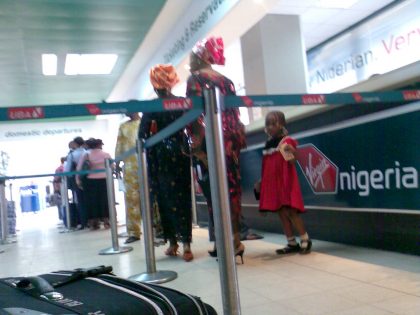A migrant’s tale
On his latest EP, Kwame Brenya turns a failed migration into musical testimony—offering a biting critique of ECOWAS, broken borders, and the everyday collapse of pan-African ideals.

Kwame Brenya. Image courtesy Yaw Asare.
Due to economic challenges in Africa, many young people have resorted to leaving the continent in search of greener pastures. Some escape these challenges by studying overseas; others find labor opportunities and resort to using dangerous routes into Europe or the Americas or to neighboring states (like Ghanaians in Nigeria) or elsewhere in Africa (South Africa or North Africa, particularly Morocco and Tunisia). The latter are often halfway houses to a final destination in Europe or North America.
The story of one such migrant’s journey is the theme animating “Four Days in Faso,” a four-track EP by Ghanaian highlife singer, Kwame Brenya. The lyrics are partly autobiographical; Brenya tells us his story of his attempt to jakpa (escape) in a form reminiscent of Akan folklore—Anansesɛm—accompanied by the sound of plaintive highlife guitar strings and drums. Four Days in Faso is Brenya’s third EP.
Brenya’s second EP utilized a similar folktale form. We learned of the misfortune of a man who left his village in search of his manhood or money, as the two are seen to reinforce each other. This time, Brenya brings us along with him on his misfortune as he seeks to leave the continent by way of Senegal; his failure and subsequent return to Ghana are laden with hurdles.
We do not just learn of his misfortune, but Four Days in Faso also gives the listener a grasp into the challenges faced by those living inside the borders of the West African regional integration organization, Economic Community of West African States (ECOWAS). ECOWAS functions as a regional integration unit that allows for economic cooperation among West African member states and the free movement of people and goods within the region. Members of ECOWAS have the right—on paper at least—to move through its member states freely. However, anyone who has traveled across these borders will notice how restrictive and transactional traveling within ECOWAS states is.
In Four Days in Faso, Brenya tells of being denied a visa to Thailand while he was in Senegal. The singer is searching for greener pastures far away from the warmth of the land of Africa into distant lands whose promises are merely vague. He is denied the much-needed visa. Disappointed, Brenya (or the character he raps about) grudgingly decides to return to Ghana. However, Brenya had spent all his savings journeying from Ghana to Senegal. His journey to Senegal and his stay during the visa process also reveal to him the fallacy of Pan-Africanism: the ideology that brings us together as Black and African people. Manhandled by security operatives, Brenya is constantly reminded that he does not belong in each country he finds himself in. Pan-Africanism is unable to save him from the extortionary clutches of these security operatives as he is arrested simply for not providing a residence permit identity card from Senegal, despite showing his identity cards from Ghana. He had to cough up huge sums of money to free himself and procure for himself this identity card. Brenya sings:
Ei! West Africa | Ei! West Africa
Sɛ yɛnyɛ baako | So we are not one people
Ghana dehyeɛ abɛyɛ ɔhɔhoɔ wɔ Senegal | A royal from Ghana has become a stranger in Senegal
The constant harassment and the expensive visa process, leaves our Brenya broke. In the end, he must sell his “disappointed suit” to afford some money to pay his fare for the bus journey back home, as a week’s journey now becomes eight months.
Kwame Brenya is not only hustled by security operatives. Colonial language differences also hustle him. Brenya travels from a country that uses English as its official language to a country that uses French for official purposes. He is singled out for not knowing French. It also causes him to miss his bus.
The effect of African countries adopting colonial borders is revealed when Brenya finds himself in a town known as Hamile. Half the town lies in Ghana, while the other half is in Burkina Faso. He stands in the half located in Burkina Faso, unable to cross into Ghana due to the cost of crossing the border into Ghana by motorbike. He decides to cross the border via an unapproved route and is accosted by a Ghanaian immigration officer who demands money from him.

Anyone who has crossed borders in Africa by land will attest to their frustration at border checkpoints. In 2016, I traveled to Mali, where I was extorted at almost every checkpoint due to my Ghanaian passport. Tired of this happening, I protested the extortion at the border of Mali as I was exiting the country. The immigration official took out a whip and threatened to use it on me should I protest further. My confiscated passport was only returned to me after making an illegal payment. I have also experienced this form of extortion at the borders of Togo, Benin, and Senegal.
Unfortunately, regional integration efforts have not effectively facilitated the free movement of people and goods within regional blocs. Brenya’s album highlights the challenges of movement within the ECOWAS region. A strong sense of pan-Africanism among the masses can only emerge if people and their goods can move freely across the continent. As ECOWAS faces growing skepticism from the transitional governments of Mali, Burkina Faso, and Niger, Kwame Brenya’s new album prompts us to consider another layer of regional integration. It calls for a critical reassessment of this structure, lest it loses touch with the people it aims to serve.



